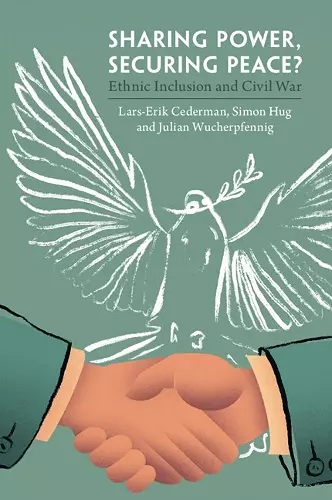Sharing Power, Securing Peace?
Ethnic Inclusion and Civil War
Simon Hug author Lars-Erik Cederman author Julian Wucherpfennig author
Format:Paperback
Publisher:Cambridge University Press
Published:7th Jul '22
Currently unavailable, and unfortunately no date known when it will be back
This paperback is available in another edition too:
- Hardback£74.99(9781108418140)

Shows how power-sharing practices reduce violence both preventively and after conflicts by giving potential violent challengers access to central and/or regional power.
Addressing the widespread academic criticism of power sharing, this book uses systematic data and advanced methods to highlight the importance of practices as opposed to formal institutions, their preventive rather than merely post-conflict effect, and how they are invoked by governments in anticipation of potential violent challenges.Does power sharing bring peace? Policymakers around the world seem to think so. Yet, while there are many successful examples of power sharing in multi-ethnic states, such as Switzerland, South Africa and Indonesia, other instances show that such arrangements offer no guarantee against violent conflict, including Rwanda, Yugoslavia, Zimbabwe and South Sudan. Given this mixed record, it is not surprising that scholars disagree as to whether power sharing actually reduces conflict. Based on systematic data and innovative methods, this book comes to a mostly positive conclusion by focusing on practices rather than merely formal institutions, studying power sharing's preventive effect, analyzing how power sharing is invoked in anticipation of conflict, and by showing that territorial power sharing can be effective if combined with inclusion at the center. The authors' findings demonstrate that power sharing is usually the best option to reduce and prevent civil conflict in divided states.
'This masterful analysis shows conclusively that much of the skepticism regarding power-sharing is misguided. While power-sharing does not offer any firm guarantees for peace and stability, inclusive practices at the center and territorially shared power clearly remain the most promising tools for solving and preventing serious ethnic and other conflicts. The book's conclusions are highly valuable for scholars and even more so for practical policy-makers.' Arend Lijphart, Research Professor Emeritus of Political Science, University of California, San Diego
'Theoretically and methodologically ambitious, impressively global in scope, and covering both conflict and non-conflict contexts, Cederman, Hug and Wucherpfennig convincingly argue that power-sharing builds peace in multi-ethnic states. These findings should guide scholars and practitioners in how to promote inclusive governance.' Elisabeth King, co-author of Diversity, Violence, and Recognition: How Recognizing Ethnic Identity Promotes Peace
'As Fred Iklé's classic book states in its title, 'Every War Must End,' and most civil wars end with some form of power-sharing, formal or informal, between the state and its challengers. This landmark book by Cederman, Hug, and Wucherpfennig offers valuable new insights and a wealth of new empirical results on whether sharing power helps secure the peace in the aftermath of ethnic war. With attention to the usual methodological pitfalls in the analysis of observational data and conceptual innovations throughout their book, Cederman, Hug, and Wucherpfennig provide a strong argument for the peace-inducing effects of the practice - rather than merely the promise - of sharing political power, while also noting that power-sharing institutions are no panacea. This extraordinary book charts the way forward in the quantitative study of civil war.' Nicholas Sambanis, Professor of Political Science, The University of Pennsylvania
'There is little doubt that Cederman, Hug, and Wucherpfennig have written a landmark study in the power-sharing and conflict literature. The sheer volume of empirical evidence in the book is astonishing and sets the standard for cross-national research on civil war. Scholars, students, and policy makers interested in ethnic politics, war, and conflict resolution will all benefit from reading it - especially those inclined to skepticism of power sharing (as this reviewer was). I would also recommend the book to anybody working with observational evidence subject to selection issues, as the authors provide an exemplary model for rigorous and transparent analysis of cross-national data.' Philip A. Martin, Perspectives on Politics
ISBN: 9781108406550
Dimensions: 228mm x 151mm x 18mm
Weight: 480g
300 pages